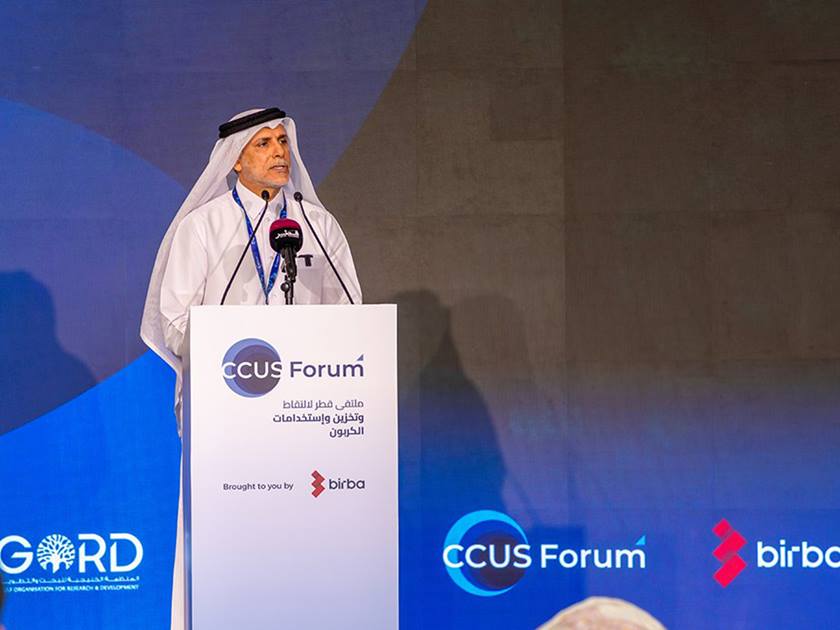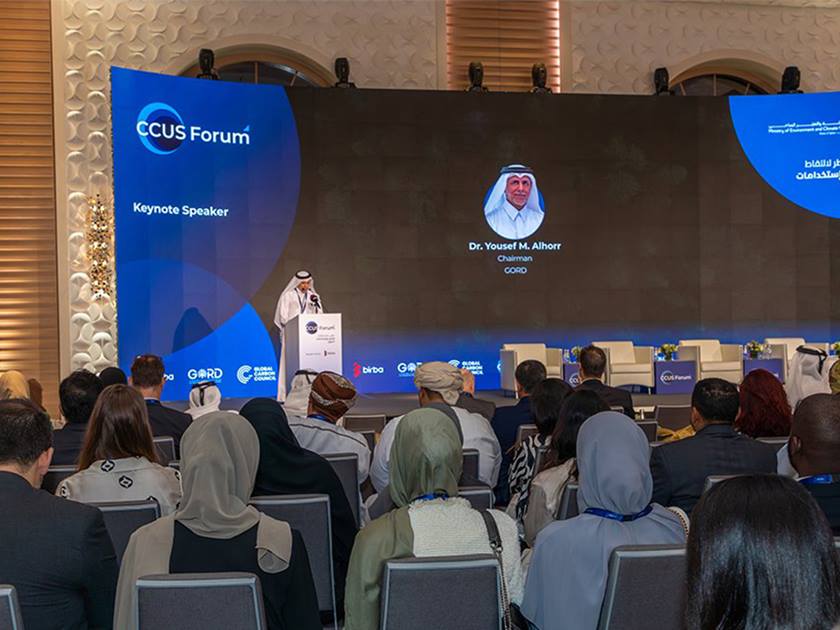Doha, May 29 (QNA) - Chairman of the Gulf Organisation for Research & Development (GORD) and Chairman of the Global Carbon Council Dr. Yousef bin Mohammed Al Horr asserted that the launch of carbon capture and storage projects will provide millions of tons of long-term emissions.
He outlined that such projects would double the positive effect of 1500 projects that were rolled out to the council by 45 countries to mitigate climate change effects within greenhouse gas reduction projects.
In his inaugural speech before the CCUS Forum that took place on Monday, under the auspices of HE Minister of Environment and Climate Change Sheikh Dr. Faleh bin Nasser bin Ahmed bin Ali Al-Thani, Al Horr emphasized that the State of Qatar is the first venue for a first international carbon credit program rooted in the Global South. He pointed out that the forum is a turning point in the joint Gulf efforts to overcome exigent challenges facing the region and the world in climate change.
Transitioning to a low-carbon sustainable economy will enable Qatar to diversify the global energy mix, reduce greenhouse gas and subsequently contribute to the global transition to a low-carbon economy in accordance with Paris Agreement, Al Horr said.
The council is proud that the State of Qatar is the venue of the first international carbon credit program rooted in the Global South, he added, noting that the council is extending the invitation to everyone to engage in the public consultation, which is poised to be announced soon as one of the Incentivizing initiatives for carbon capture and storage projects through issuance of carbon credits.
The Founding Chairman of the Gulf Organisation for Research & Development revealed the ability of the new approach to providing millions of tons of long-term emissions, predicting that GCC states will generate 2 billion of carbon credits over the next 8 to 10 years that will be utilized within storage projects.
HE former Minister of Energy and Industry Dr. Mohammed bin Saleh Al Sada said the Arab region has made great strides in overcoming climate challenges since the launch of the Climate Conference (COP18) that was previously held in Doha, in addition to the Sharm El-Sheikh Climate Change Conference (COP 27) and the upcoming edition (COP28) which is poised to be held in Dubai this year.
He outlined that approaching Net-Zero Emissions and their reduction requires the use of all clean and effective technologies available for energy, including carbon capture, use and storage.
The forum's objectives and its mission are incorporated into the concerned countries pledges at the national level where 13 states have submitted them, alongside the European Union, where several of them became part of countries that are committed to attaining Net-Zero Emissions by 2050, Al Sada noted.
He reviewed various methods of carbon capture and utilization (CCU), such as the increase in oil recovery which is injected in oil fields to augment crude oil production by storing the Carbon Dioxide underground.
As for major oil-producing countries, he said, the combination of CCUS and increased oil recovery can dramatically reduce production costs, as well as utilize carbon dioxide in construction materials, chemical elements, and fuel, emphasizing that such a method will open new economic access and promote innovation.
HE Al Sada called for addressing the challenges that impede the implementation of the CCUS technologies to broadly utilize their benefits, pointing out that there are an array of methods in pre-combustion and post-combustion capture of carbon and each method has its technical requirements.
However, it is very imperative to optimize these technologies and reduce their energy needs, in addition to optimizing the capture techniques to achieve the anticipated economic feasibility, he said.
His Excellency said the capture technology faces overwhelming challenges related to their high costs, including the challenge of finding appropriate carbon dioxide storage sites, although depleted oil and gas reservoirs or deep salt basins are preferable storage sites, he noted, however, they should have sufficient capacity, along with geological safety to be securely stored in the long term.
It is noted that the overall site characterization, monitoring, and risk assessment are crucial to ensure the stored carbon dioxide remains insulated and make sure that it cannot be leaked into the environment while addressing these challenges require technological advancement, supporting policies and legislations, financial incentives, and international cooperation.
The CCUS technologies can be an effective and indispensable tool to reduce emissions and contribute to global efforts dedicated to combating climate change.
Organized by Birba company, the Carbon Capture, Utilization, and Storage (CCUS) Forum features interactive sessions that offer opportunities to share expertise and ideas among the attendees, in addition to developing international cooperation in this field. The event also includes presentations on research and technologies that enhance capture operations.
The forum intends to review the latest developments in the capture, storage, and carbon utilization field, as well as highlight the innovations and technologies that underpin these vital operations and discuss their relevant policies and regulatory framework, along with the findings that have been achieved around the world.
In cooperation with strategic partners and with the participation of a contingent of interested experts from all over the world, the forum will run until May 31. Its convention in the State of Qatar is a critical step towards overcoming challenges related to climate change, while the second session will convene in 2024.
(QNA)



